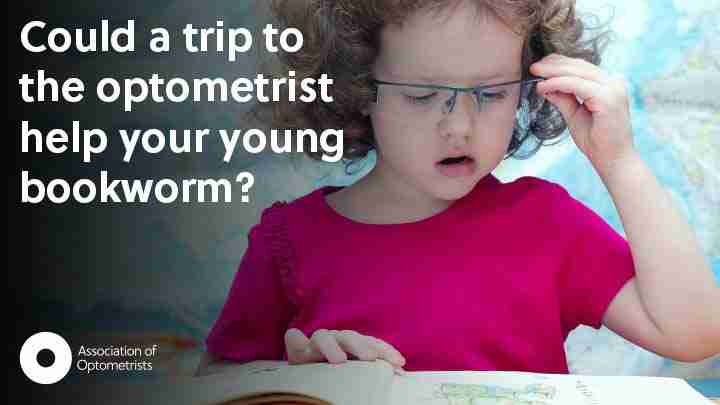Looking After Children's Eyes - Sight now for success later.

DID YOU KNOW...
Up to 1 million children in the UK currently have an undetected vision problem.
Many parents, teachers, and children themselves may be unaware that something is wrong.
Children's eye examinations and glasses are free on the NHS.
HAS YOUR CHILD HAD A SIGHT TEST?
Over 90% of children visit a dentist regularly.
Yet only 53% of children have ever had a sight test.
WHY VISION MATTERS
Good eyesight is crucial in making sure a child develops to their full potential both at school and socially. Anyone can develop sight problems – but it is especially important to look after children’s eyes. The eye is still developing throughout early childhood so if problems are treated early, it can make a lasting difference.
SYMPTOMS TO LOOK OUT FOR
Some eye conditions do not display any signs or symptoms, so the only way to know for sure is to take your child for a sight test. Signs which may show there is a problem with a child’s sight include:
· an eye appearing to drift inwards or outwards.
· difficulty concentrating.
· behavioural problems.
· headaches.
· sitting too close to the television; or
· rubbing their eyes, a lot.
The condition ‘lazy eye’ can run in the family, so if someone in your family has either an eye turn (‘squint’) or suffers from reduced vision in one or both eyes (‘amblyopia’), it’s a good idea to take any related children for a sight test.
VISION SCREENING AND SIGHT TESTS
Vision screening is a short examination designed to pick up lazy eye, or amblyopia. Screening can indicate that there is a problem, but it cannot diagnose exactly what is wrong. You may assume that your child will be screened at primary school however this does not happen in all areas of the country. A sight test is a more comprehensive check which can pick up many other conditions, including colour vision defects, binocular vision problems and the need for glasses. Taking children for sight tests from an early age helps to build good eye health habits into adulthood. We recommend that children have a sight test by the age of three, so that any conditions are picked up and treated early.
WHAT CAN YOU DO?
· Make sure your child’s vision is checked before they start school.
· Include a sight test in your ‘back to school’ routine.
· After the first test it is advisable to return regularly as recommended by your optometrist.
· Encourage children to get outdoors – regular play and exercise can help with eye health – studies show two hours of outdoor activity a day is ideal for healthy eyes.
· Help them to eat healthily, including oily fish and dark green vegetables, such as spinach and kale, and drink plenty of water.
· Protect your child’s eyes from the sun – never let them look directly at the sun. When choosing sunglasses, you should always ensure that they carry the CE or British Standard marks.
© 2025 Copyright One Vision Hive and Holland & James.



